Saturday Feb 14, 2026
Saturday Feb 14, 2026
Monday, 20 November 2017 00:10 - - {{hitsCtrl.values.hits}}
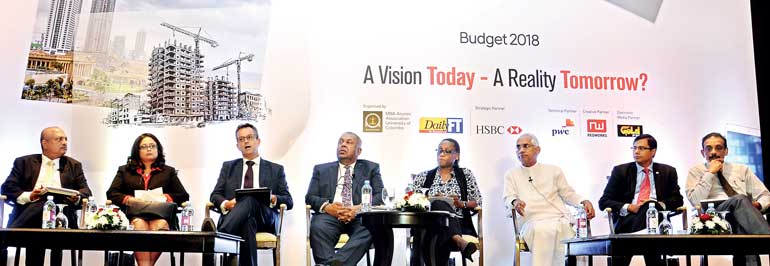
By Uditha Jayasinghe
Ironing out the details of Budget 2018 and discussing a plethora of linked economic issues including liberalisation of the shipping industry, state enterprise reform, the sugar tax and listing of State banks was the aim when a host of experts led by Finance Minister Mangala Samaraweera and State Minister of Finance Eran Wickramaratne gathered recently.
The duo were joined by top private sector pundits who gave their views of policy measures and additional steps the Government would have to implement to support the key proposals set out in Budget 2018. Contentious issues were also highlighted by an enthusiastic audience who peppered Samaraweera and Wickramaratne with questions on a range of topics.
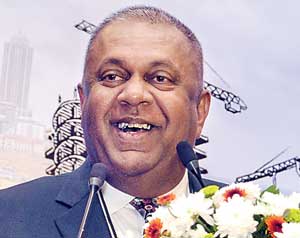 Frankly, if I may be very open, I know there has already been a lot of opposition to this idea of opening up the shipping sector but they must come to terms with the realities of the modern world. For example if Sri Lanka is to walk the talk about becoming the maritime hub of the Indian Ocean, we all in Sri Lanka love to talk, we love to grandstand about our vision but when it comes to implementation, everyone wants to pull back but it is high time that as a nation we realise, there are certain things we have to do and one is to open up – Finance Minister Mangala Samaraweera
Frankly, if I may be very open, I know there has already been a lot of opposition to this idea of opening up the shipping sector but they must come to terms with the realities of the modern world. For example if Sri Lanka is to walk the talk about becoming the maritime hub of the Indian Ocean, we all in Sri Lanka love to talk, we love to grandstand about our vision but when it comes to implementation, everyone wants to pull back but it is high time that as a nation we realise, there are certain things we have to do and one is to open up – Finance Minister Mangala Samaraweera
Liberalisation to the fore
Finance Minister Mangala Samaraweera told the post-Budget forum organised by the Daily FT and the Colombo University MBA Alumni Association with HSBC as strategic partner, that his ministry would dedicate itself to implementing Budget 2018 while building consensus with the private sector but adjustments would have to be progressive and in the best interests of Sri Lanka.
“I would say nothing is cast in stone. We are willing to listen to suggestions where there may be anomalies to correct, but the basis of free enterprise is non-negotiable, liberalisation is non- negotiable. But within those parameters, certainly, we are willing to be flexible,” he told a packed audience.
Responding to questions, the Finance Minister also emphasised that the Government had the political will to take forward an ambitious Budget that seeks to reform a slew of outdated laws and introduce new regulations that will govern key revenue garnering institutions such as the Customs and Excise departments.
“We do have the political will and I would say Sri Lanka has a good chance to implement these reforms because for the first time the two principal parties are working together. The SLFP and the UNP have come together despite certain differences from time to time. The overall thrust of the vision has been accepted by both parties. There could be differences of opinion from time to time but when it comes to the overall objectives of the Budget, I would say we are of one mind.”
No more a nanny State
Samaraweera also reiterated his Budget preamble where he recapped Sri Lanka’s history as a trading nation that had relations with Europe and Far Eastern countries and noted that every “Golden Age” of the country’s history was underpinned by a vibrant economy based on trade with the world. To regain such an age and achieve development Sri Lanka needs to end its penchant for acting as a “nanny state” to different stakeholders including the business community, he noted.
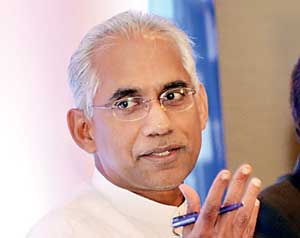 Sri Lanka has to think very very hard. As a country that has been open to world trade for thousands of years, we have two choices. We can continue to protect and have moderate growth or we can become radical. Sri Lanka can jog along as it has or it can become a global hub and have exponential growth – State Minister of Finance Eran Wickramaratne
Sri Lanka has to think very very hard. As a country that has been open to world trade for thousands of years, we have two choices. We can continue to protect and have moderate growth or we can become radical. Sri Lanka can jog along as it has or it can become a global hub and have exponential growth – State Minister of Finance Eran Wickramaratne
“We can be a nanny to the poor and the underprivileged. In that part of one’s obligation to society we certainly will continue to honour. I mentioned about the social safety nets, especially in a free market situation, to have a strong safety net for the more vulnerable segments of society I think is very important but we are no longer willing to be a nanny to the private sector or to any other sector that wants to be protected. They have to learn to compete.”
He also touched on the sensitive standoff that has divided the shipping industry where different factions have protested and others supported the Budget proposal to allow 100% ownership by foreign companies. Samaraweera insisted that for Sri Lanka to keep pace with its peers liberalisation was essential and the country could not keep ignoring its opportunities for growth.
“Frankly, if I may be very open, I know there has already been a lot of opposition to this idea of opening up the shipping sector but they must come to terms with the realities of the modern world. For example if Sri Lanka is to walk the talk about becoming the maritime hub of the Indian Ocean, we all in Sri Lanka love to talk, we love to grandstand about our vision but when it comes to implementation, everyone wants to pull back but it is high time that as a nation we realise that if we are serious about making Sri Lanka the maritime hub it ought to be. If they are serious about making the newly emerging Financial City an international centre, there are certain things we have to do and one is to open up.”
Implementation challenge
“We can’t think of becoming a hub if we keep our doors closed. India and Pakistan have liberalised this sector 100%. So we too have to walk the same path and all these protectionist measures for the private sector have to be worked out and revisited if we are to move forward as a country.”
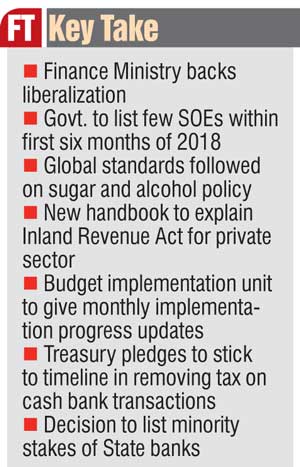
Despite all good intentions, the Budget faces crucial challenges with the main concern being implementation, Samaraweera went on to say. He conceded that the Government had to improve in this segment and was already taking steps to improve reaching targets and transparency.
“Implementation I would say is perhaps the biggest challenge for us. I believe we have a good vision for Sri Lanka. We have a good plan but where Sri Lanka has failed so far is at the implementation stage. I want to ensure that, at least next year, put a lot of emphasis on implementation. In fact I have started a Budget implementation unit, which will be under Finance Ministry Advisors Mano Tittawella and Economist Deshal de Mel along with the Prime Minister’s Office we will see that there is a higher percentage of implementation this year than before,” he said.
“We burned a lot of midnight oil in deciding whether to have this levy or not. It was not something done easily but we finally realised the circumstances basically forced us to do so.”
“All of us know we have introduced the new Inland Revenue Act, which comes into play from April 2018, so we need to bridge this gap. Definitely from 2018 with the new IRD Act we hope that with the new structure there would be additional direct taxes so it is a stop-gap situation. The Social Responsibility Levy, which was there for a specific period, was removed by the Government so this tax too will be removed at the right time. This is planned just for three years,” Treasury Deputy Secretary S.R. Attygalla said.
IRA brings consistency
Questions were also raised on the origin of the new Inland Revenue Act with the Government insisting that even though technical assistance was obtained by the International Monetary Fund (IMF) the legislation was very much a Sri Lankan Act.
Finance Minister Eran Wickramaratne, who had arrived to join the discussion, at this pointed noted that the Inland Revenue Act was at mid-way point when he and Finance Minister Mangala Samaraweera was appointed to the portfolio and the two took several months to understand concerns of various groups and over 100 amendments were moved in Parliament when the act was presented.

He also pointed out that the Act made tax filing easier but acknowledged that an explanatory guide would be beneficial for the private sector. A handbook of this nature is already in formulation, he said, and would assist in understanding some of the clauses. Additionally the Act also reduced the discretionary power of the Minister and therefore less space for interference or preferential treatment.
The Government also delayed the implementation date to April 2018 as requested by the private sector and ensured that taxes would not be charged retrospectively. Wickramaratne conceded that there could be disagreements on the rates and the groupings acknowledging that he himself did not agree on all the clauses but reiterated that the Inland Revenue Act would bring consistency as the Government would not change it in the future.
Sugar tax logic
Responding to the contention that the tax on sugar in the Budget should have been imposed at the source rather than passed onto the carbon drink manufactures, which could make it unsustainable, State Minister of Finance Eran Wickramaratne quipped: “Thank you for the idea. Next time I’ll use it.”
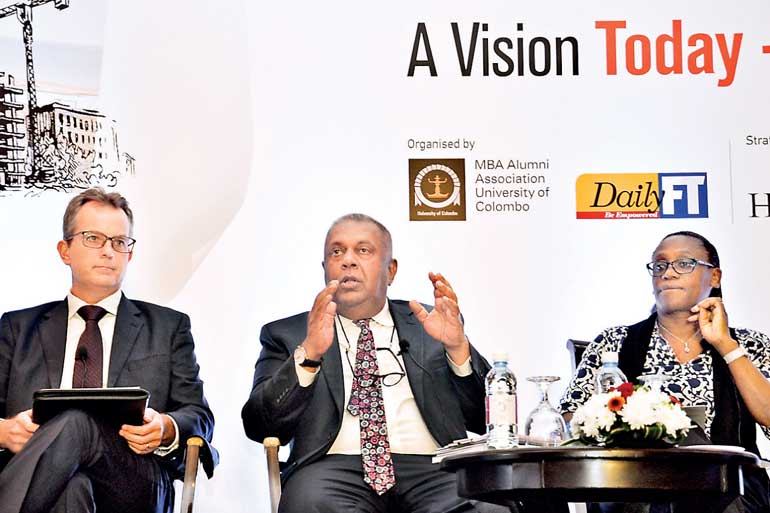
“I don’t like to comment too much on what doctors should be commenting on. The logic behind alcohol was based on the international principle that the tax should correspond to the strength of the alcohol. The decision was solely made on principle and that was the principle that was adopted there. In terms of the carbonated drinks, that was more the consideration of consumption by children or youth, therefore discouraging it. I don’t think that is the only method of discouraging it but taxation is one way. In all taxation policies there are winners and losers. Some of those sugary drinks can convert to the ‘light’ version of it.”
He also said that there was no intention to extend the sugar tax to milk-based beverages.
“I will say as a practical reality that we are a coalition and in the Government there is more than one view. Minister Samaraweera and I can’t both be out of Parliament. That’s why he left; because we have to listen to basically every view that is coming and make our arguments as to why we have taken some positions. Now if it’s a one party Government, obviously, it is much easier but when it is a coalition of parties, it is not easy to do that. This is the reality.”
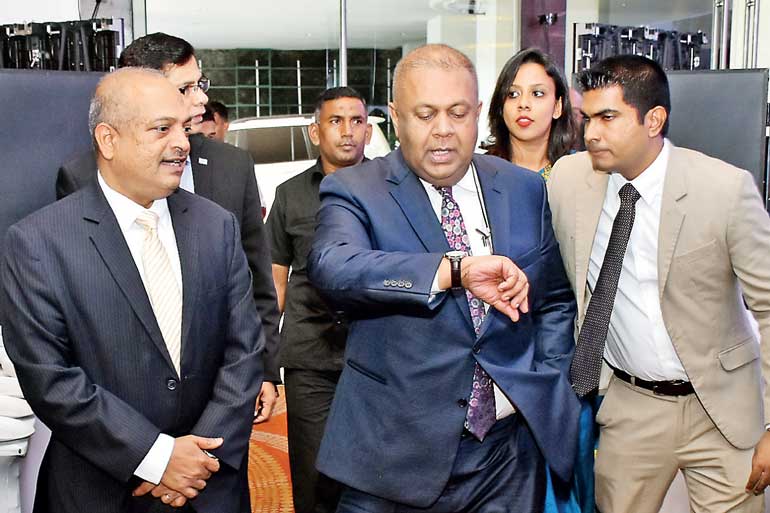
However, Wickramaratne argued that there was a plus point to this ferocious democracy, especially in the case of transparency. He noted that some stakeholders would criticise this as having an economic impact and went on to say that he agreed with that point of view. “But we can’t have it both ways. If you want transparency then you get transparency. Certainly the unity Government is bringing that transparency because if you had a one-party Government some of the things that you are seeing, the clean up that you are seeing, would not be happening.”
Divesting SOEs
On the subject of divesting loss-making State Owned Enterprises (SOEs), the Minister was pragmatic of the political challenges but stated that the Government was focused on several targets that would be easier to achieve.
The Government had earlier moved to divest Lanka Hospitals and several hotels by listing them on the stock exchange and Wickramaratne indicated that this would happen within the first six months of 2018.
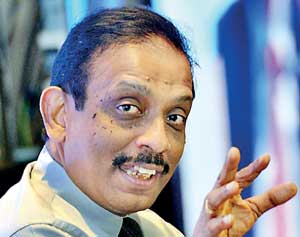 The Social Responsibility Levy, which was there for a specific period, was removed by the Government so the tax on cash bank transactions too will be removed at the right time. This is planned just for three years - Treasury Deputy Secretary S.R. Attygalla
The Social Responsibility Levy, which was there for a specific period, was removed by the Government so the tax on cash bank transactions too will be removed at the right time. This is planned just for three years - Treasury Deputy Secretary S.R. Attygalla
“The country is going through a transition period and there are consequences that follow that transition period. When it comes to policymaking as well, because one party is of the view that assets can’t be sold and there is something intrinsically wrong in selling assets, although some people hold this as an ideological position, we don’t hold that position. We are looking at returns all the time and what is the benefit to the citizen. That is where we are moving, that is where the Budget is moving and that is where we are moving our friends in the unity Government also.”
Government officials also defended the decision to maintain exemptions on public essentials such as education, fertilizer, medication and flour even though taxes on them would have earned the Government Rs. 160 billion in revenue. Several items have been taken out, which along with the VAT on apartments, would earn about Rs. 20 billion additional revenue to the Government but items that would disproportionately affect the poor were kept tax-free.
Shipping for hub status
The issue of liberalising the shipping industry was raised by the audience with one question insisting that the move would not attract more investment to Sri Lanka since it was not a capital intensive measure. In response Wickramaratne noted that it was understandable for different segments to have different views on this but noted that as far as the Government was concerned it believed liberalisation was the way forward.
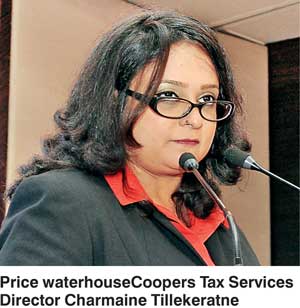
“If I were to look at the big picture on the Sri Lankan economy, we have had an economy that was freed in 1977 but since then the economy has become more protectionist. The benefits of a free economy versus the benefits of open economy have been debated heatedly but there is no one answer to it. Larger countries that have a larger internal market have some basis for protecting their borders because they have the population to sell to. An island like ours needs to be open if it wants to raise living standards.”
“With the rise of Asia we have to make an important strategic decision now. We were in this position possibly 500 years ago, probably second only to China by trade. So Sri Lanka has to think very hard, as a country that has been open to world trade for thousands of years, we have two choices, we can continue to protect and have moderate growth or we can become radical.”
Sri Lanka can “jog along” as it has or it can become a global hub and have exponential growth, he said. The liberalisation move is not necessarily for the shipping industry, the Minister said but rather to grow the entire economy through services, logistics, freights and other sectors.
“If large companies want to continue using the present system they are free to do so but if they decide to come and invest we don’t want to create a barrier, so that was the logic behind this. Concerns in the industry are natural and we are dialoguing with the industry and seeing how they could be addressed. In the liberalisation process there will be winners and losers; the Government is sensitive to it and will come with trade adjustment packages as well.”
Listing of State banks
The challenge of making choices as a nation was mentioned a second time by the State Minister of Finance who passed the ball of reform back to the State banks.
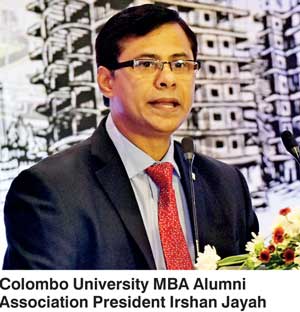
“We don’t have an agenda to privatise. If the State banks want to grow they have to raise their capital and we have already stated in the Budget how much capital will be made available to them. The choice is theirs; if they want to grow they have to raise capital. If they don’t then their significance in the local economy will drop. When I was a child they had 80% of banking assets and that has dropped to 45% now. If they want to maintain that percentage they have to raise capital. If they don’t they will keep dropping, the choice is theirs, we don’t have to argue about it. The banks need to understand this is their reality.”
Forum’s technical partner PwC Director Tax Services Charmaine Tillekeratne shared insights on some of the key proposals in 2018 Budget as well as implications and challenges. The forum participants were enriched with two comprehensive publications by PwC providing detailed commentary on 2018 Budget proposals and analysis on tax policies.